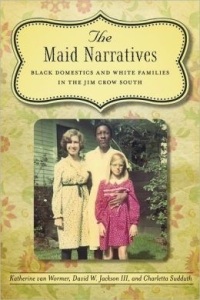The Maid Narratives
September 29, 2013 § 2 Comments
 A new book from the Louisiana Press, The Maid Narratives: Black Domestics and White Families in the Jim Crow South “shares the memories of black domestic workers and the white families they served, uncovering the often intimate relationships between maid and mistress. Based on interviews with over fifty people—both white and black—these stories deliver a personal and powerful message about resilience and resistance in the face of oppression in the Jim Crow South.” The authors, Katherine Van Wormer, David Walter Jackson, and Charletta Sudduth deftly address the conflicts, paradoxes and realities of African American women who worked in white homes and adds significantly to the sparse information about African American domestics.
A new book from the Louisiana Press, The Maid Narratives: Black Domestics and White Families in the Jim Crow South “shares the memories of black domestic workers and the white families they served, uncovering the often intimate relationships between maid and mistress. Based on interviews with over fifty people—both white and black—these stories deliver a personal and powerful message about resilience and resistance in the face of oppression in the Jim Crow South.” The authors, Katherine Van Wormer, David Walter Jackson, and Charletta Sudduth deftly address the conflicts, paradoxes and realities of African American women who worked in white homes and adds significantly to the sparse information about African American domestics.
Lewis R. Gordon, an Afro-Jewish philosopher, political thinker, educator, and musician, features the book in his blog and writes a beautiful tribute to ancestors who worked as domestics. “The Maid Narratives tells a story with which many of us are familiar and one that continues to be misrepresented in so many ways, as the movie 2011 movie The Help (which I found unbearable) attests.
Van Wormer and her co-authors offer a corrective to such misrepresentations. There is a wider picture today, as we think about a world that locks women in the role of domestics and servants. Black women in particular have made great strides, as we see in the achievements of such icons as Angela Davis, Marian Wright Edelman, Michelle Obama, and even Condoleezza Rice (for the conservatives out there), to name a few. But we don’t want to collapse into the presumption that those women who worked as domestics should somehow be degraded and forgotten. Their labor, often alienated, served as the backbone for the survival and future of all of us, and many of them, by working inside, enabled other women to work outside. I don’t know any black professional who could claim to have no domestics in her or his ancestry. Their work, their sacrifice, brought shelter over our heads, food on the table, and investments in the future. Many of them worked under precarious circumstances and challenging conditions—in many cases with little distinction from the days of in-house slavery. So, today, I simply say to our domestic ancestors, and those who continue to toil for us to have a better tomorrow, thank you.”
Annie Lee took care of my 3-generational family from my pre-adolescence until after I had graduated from college. She was the person there when my grandmother and then my great-aunt died, and the person my aunt tried to talk with about her unhappiness. Her kind, loving presence did much to make up for my critical mother and stern grandmother. I had enough sense to value her highly and to keep up with her over the following years. Aware that her years of service to my family did not result in any retirement income, I sent her a check every month, and saw her several times a year, when my travels made this possible. I was the only white face at her 90th year birthday party, feeling both pleased that her family had invited me, but also pained that none of the other families that she had cared for so lovingly were there. I have had to ask myself if I would have had any of the grace and kindness she showed if I had been in her shoes. I think my knowing that I would not has made me into a better person.
[…] what of the biological children of these women? According to Afro-Jewish scholar Lewis R. Gordon, most African American people in the US today has a mother, grandmother or other relative who […]